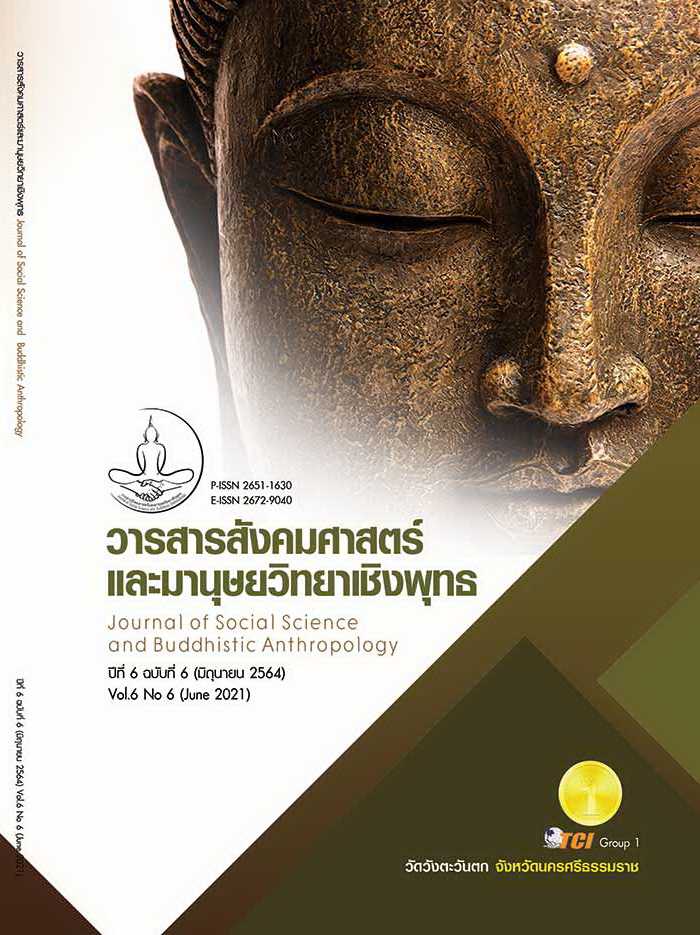DEVELOPMENT OF CO-CURRICULAR ACTIVITIES IN SOCIAL STUDIES TO PROMOTE FUTURISTIC THINKING SKILLS FOR SECONDARY SCHOOL STUDENTS
Keywords:
Co-curricular Activity, Future Thinking Skills, Social StudiesAbstract
The objectives of this research article were 1) to develop a co-curricular activity and plan for social studies to promote the futuristic thinking skills of secondary school students. 2) to study the results of using a co-curricular activity in social studies that promote the futuristic thinking skills of secondary school students. The sample group used in the research was secondary school students (M.4-M.6) from Varee Chiang Mai School, Academic Year 2018, it consisted of 30 peoples from accidental sampling. The research instruments included 1) Plans for organizing a co-curricular activity in social studies to promote futuristic thinking skills, 2) A questionnaire about futuristic thinking skills, 3) The satisfaction questionnaire for a co-curricular activity in social studies. The quantitative data was analyzed by using basic statistics. The research found that 1) The development plans of co-curricular activities in social studies to promote future thinking skills of secondary school students that had the learning management process to promote future thinking skills is known as the SPACI technique. The quality, accuracy and suitability had the total average of 4.79 which is in the highest quality level. 2) The results of the use of a co-curricular activity in social studies that enhance future thinking skills found that the students had very high level of future thinking skills with an average score of 3.84 and students with all aspects of future thinking in a very good level. And students were satisfied with the organizing a co-curricular activity in social studies that promote future thinking skills of secondary school students at a very good level. In conclusion, social studies activities based on SPACI techniques can actually develop future thinking skills for students and had a learning management approach that integrates local knowledge.
References
เกรียงศักดิ์ เจริญวงศ์ศักดิ์. (2555). การคิดเชิงอนาคต (หนังสือชุดผู้ชนะสิบคิด). กรุงเทพมหานคร: ซัคเซสมีเดีย.
คณะกรรมการพัฒนาการเศรษฐกิจและสังคมแห่งชาติ. (2560). สรุปสาระสำคัญ แผนพัฒนาเศรษฐกิจและสังคมแห่งชาติฉบับที่สิบสอง พ.ศ. 2560-2564. เรียกใช้เมื่อ 29 ธันวาคม 2560 จาก http://www.nesdb.go.th/download/plan12/
ชนาธิป พรกุล. (2554). การสอนกระบวนการคิด ทฤษฎีและการนำไปใช้. กรุงเทพมหานคร: จุฬาลงกรณ์มหาวิทยาลัย.
ชรินทร์ มั่งคั่ง. (2559). อนาคตวิทยา: ทฤษฎีและเทคนิคการจัดการเรียนรู้สังคมศึกษา. เชียงใหม่: มหาวิทยาลัยเชียงใหม่.
รุ่ง แก้วแดง. (2540). ปฏิวัติการศึกษาไทย. กรุงเทพมหานคร: สำนักพิมพ์มติชน.
สถาบันส่งเสริมการสอนวิทยาศาสตร์และเทคโนโลยี. (2559). สรุปผลการประเมิน PISA 2015 วิทยาศาสตร์ การอ่าน และคณิตศาสตร์. 2559. เรียกใช้เมื่อ 28 สิงหาคม 2560 จาก https://pisathailand.ipst.ac.th/pisa2015summaryreport
สำนักงานเลขาธิการสภาการศึกษา. (2560). แผนการศึกษาแห่งชาติ พ.ศ. 2560-2579. กรุงเทพมหานคร: บริษัท พริกหวานกราฟิก จำกัด.
เอกวิทย์ ณ ถลาง. (2544). ภาพรวมภูมิปัญญาไทย. กรุงเทพมหานคร: มูลนิธิภูมิปัญญา.
เอ็ดเวิร์ด เดอ โบโน. (2556). สุดยอดทักษะการคิด EDWARD DE BONO. กรุงเทพมหานคร: เอ็กซเปอร์เน็ท.
Wehmeyer, L. B. (1986). Futuristics. New York: A Growth Company.









